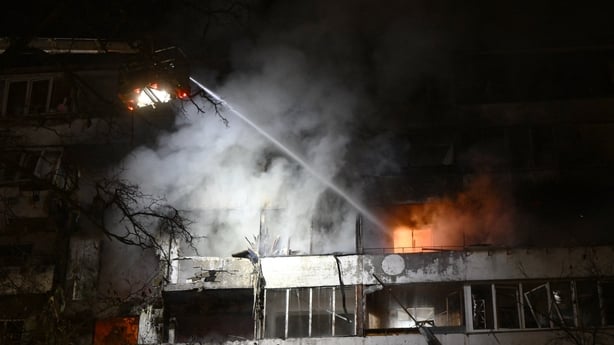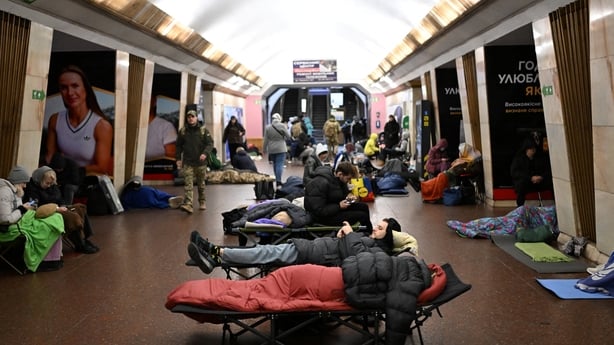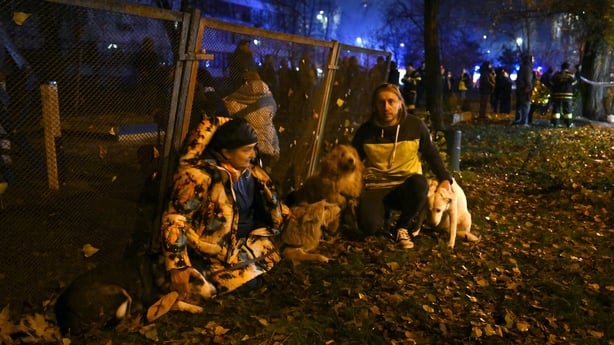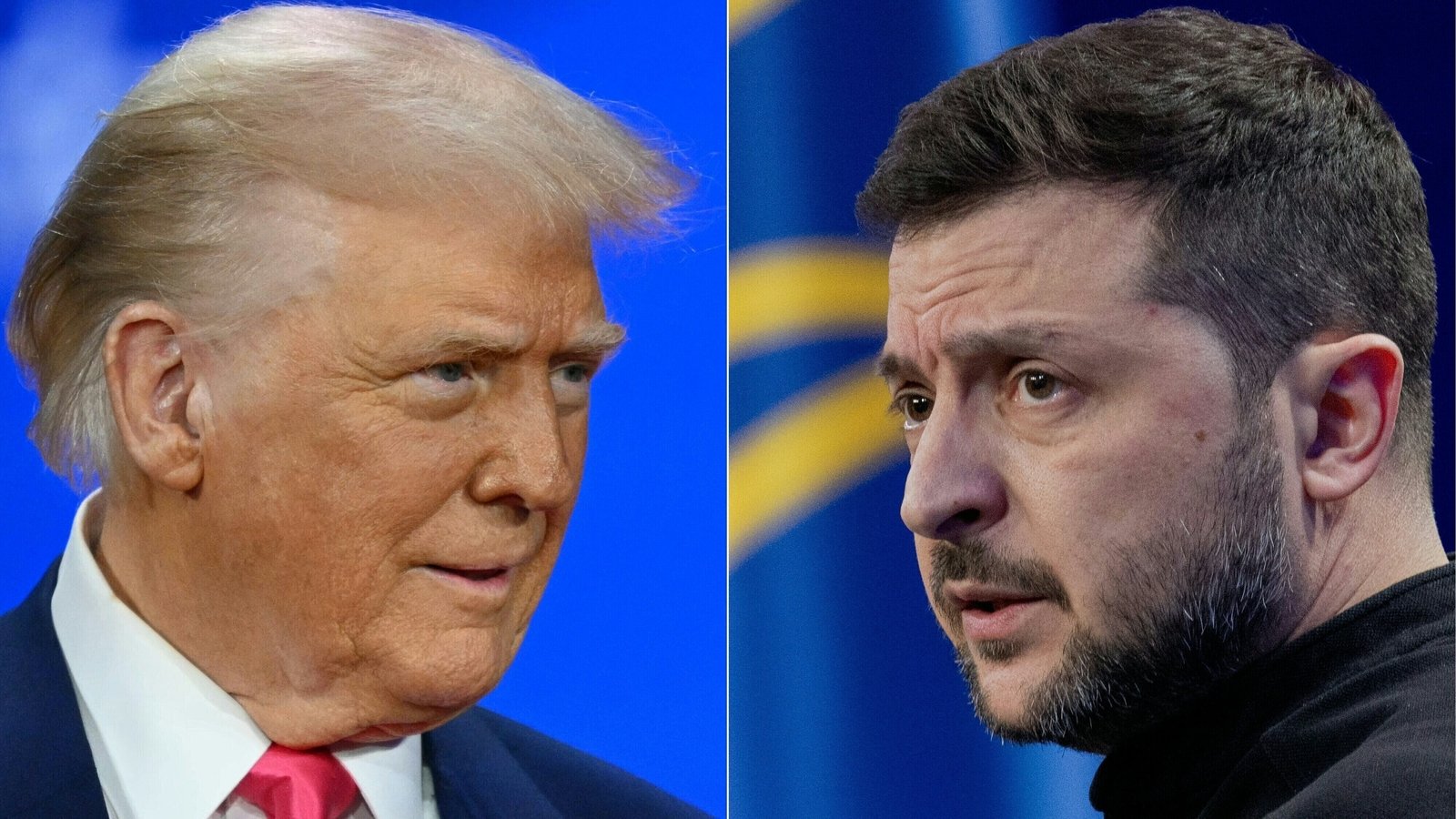US President Donald Trump has said a Ukraine-Russia deal is “very close”, but European leaders remain sceptical as Russian missiles continued to rain down on Kyiv.
Mr Trump, visibly frustrated at his failure to make good on last year’s election boast that he could quickly end the war, said “we’re getting very close to a deal”.
An initial US plan which was heavily weighted in Russia’s favour has been replaced by one taking in more of Ukraine’s interests. A Ukrainian official said that the new version was “significantly better”.
However, US officials acknowledged that “delicate” issues remain.
French President Emmanuel Macron dismissed the idea of a rapid solution, stating that there is “clearly no Russian willingness” for a ceasefire or to discuss the new, more Ukraine-friendly proposal.
Frantic discussions have been under way since the weekend when Ukrainian and US representatives met in Geneva to discuss Mr Trump’s initial 28-point plan for settling the war.
Latest talks including US and Russian delegates were taking place in Abu Dhabi, US media reported.
Leaders of a group of 30 countries supporting Ukraine also met by video.
US negotiator Dan Driscoll emerged upbeat from a meeting with Russian counterparts.
His spokesman said: “The talks are going well and we remain optimistic.”
The White House cited “tremendous progress,” while cautioning that “there are a few delicate but not insurmountable details that must be sorted out.”
Ukraine seeking Zelensky-Trump meeting this week
It comes as Ukraine wants President Volodymyr Zelensky and Mr Trump to meet this week for further talks on ending the war with Russia, a top Ukrainian negotiator has said.
“We look forward to organising a visit by the President of Ukraine to the United States at the earliest possible date in November,” Ukrainian security council secretary Rustem Umerov said on Telegram.

Firefighters quell a fire at a residential building in Kyiv after the drone strikes
Underlining the stakes for Ukraine, its capital Kyiv was hit by a barrage of missiles and hundreds of drones overnight in an attack that killed at least seven people. Residents were sheltering underground wearing winter jackets, some in tents.
US policy toward the war in Ukraine has zigzagged in recent months.
A hastily arranged summit between Mr Trump and Russian President Vladimir Putin in Alaska in August spurred worries in Kyiv and European capitals that Washington might accept many Russian demands, but ultimately resulted in more US pressure on Russia.
The latest US peace proposal, a 28-point plan that emerged last week, caught many in the US government, Kyiv and Europe off-guard and prompted fresh concerns that the Trump administration might be willing to push Ukraine to sign a peace deal heavily tilted toward Moscow.
Watch: Explosions light up Kyiv sky as Russia attacks Ukrainian capital
The plan would require Kyiv to cede more territory, accept curbs on its military and bar it from ever joining NATO, conditions Kyiv has long rejected as tantamount to surrender.
The sudden US push raises the pressure on Mr Zelensky, who is now at his most vulnerable since the start of the war in 2022 after a corruption scandal saw two of his ministers dismissed and as Russia makes battlefield gains.
Mr Zelensky said yesterday that the latest proposed peace plan had incorporated “correct” points after talks over the weekend in Geneva but that sensitive issues were still to be discussed with Mr Trump.
“As of now, after Geneva, there are fewer points, no longer 28, and many correct elements have been incorporated into this framework,” Mr Zelensky said in his nightly video address.

People take shelter in a Metro station below Kyiv amid the strikes
“Our team has already reported today on the new draft of steps and this is truly the right approach. The sensitive issues, the most delicate points, I will discuss with President Trump.”
Mr Zelensky said the process of producing a final document would be difficult. The Kremlin said it had nothing to say yet about reports of the Abu Dhabi meeting.
“Currently, the only substantive thing is the American project, the Trump project,” Kremlin spokesman Dmitry Peskov said. “We believe that this could become a very good basis for negotiations.”

Residents stand outside after evacuating a damaged residential building in Kyiv
In a separate development, Romania sent out fighter jets to track drones which breached its territory near the border with Ukraine early this morning, and one was still advancing deeper into the country, the defence ministry said.
Tensions have mounted along Europe’s eastern flank in recent months after suspected Russian drones breached the airspace of several NATO states.
We need your consent to load this rte-player contentWe use rte-player to manage extra content that can set cookies on your device and collect data about your activity. Please review their details and accept them to load the content.Manage Preferences
Read more:
Ukraine dials down US peace plan but core issues remain
Europe’s peace plan ‘doesn’t suit’ Russia
Explained: What is Trump’s 28-point Ukraine plan?
Human Rights Commissioner expresses concern over ‘transactional’ peace plan
The Commissioner for Human Rights at the Council of Europe Michael O’Flaherty has said that the US peace plan for Ukraine is concerning as it is “very transactional” and is about land and not about people.
Speaking on RTÉ’s Morning Ireland, Mr O’Flaherty said he has been concerned about this since early this year when discussions about peace came to the table, usually without Ukrainian involvement.
“It was about land. It wasn’t about people. A peace that isn’t about people and their dignity and showing them respect is a peace that ultimately is not going to be successful,” he said.
He gave the example of the Good Friday Agreement, which he said had a commitment to human rights and that has made it last.
“The same with the Dayton Peace Agreement for all its flaws in Bosnia-Herzegovina, these places would have fallen back into conflict again, were it not for the fact that human beings and human welfare, human dignity and justice were put at the heart of the eventual settlements.”
Mr O’Flaherty said that there are few women included in the peace negotiations, which he said is vital as evidence shows that including women in talks leads to better outcomes in any peace process.
“That’s the long wisdom of the United Nations. For years now, there’s been a push to promote the role of women in peacemaking.
“The absence from the UN at the heart of the discussion at the table means that aspects such as this appear to be neglected.”
He said that while he is not privy to what is going on in Geneva at the talks he has not “seen a single image of a single woman”.
“And we know that if women are at the table, we end up having better, more enduring peace outcomes,” he said.

